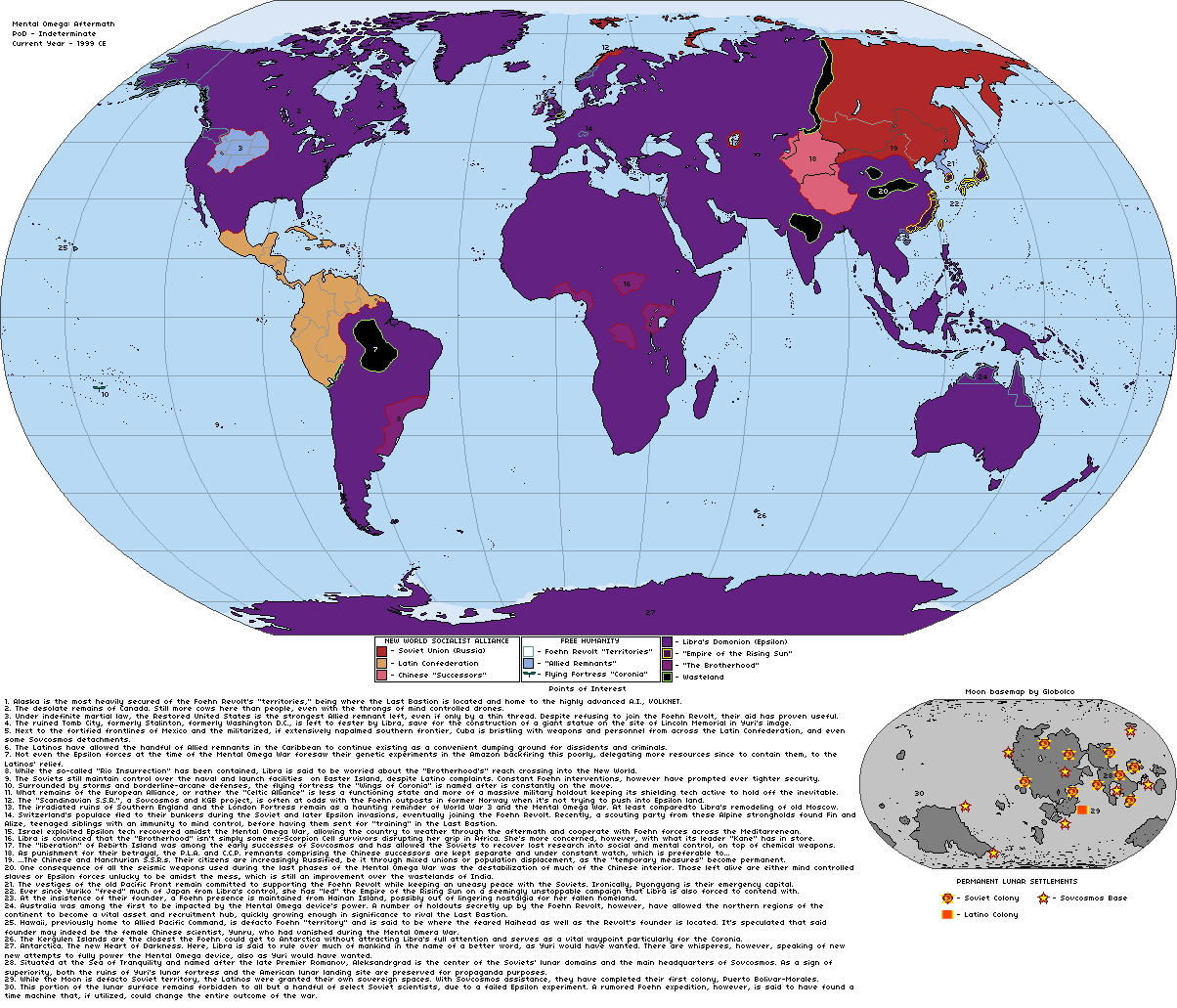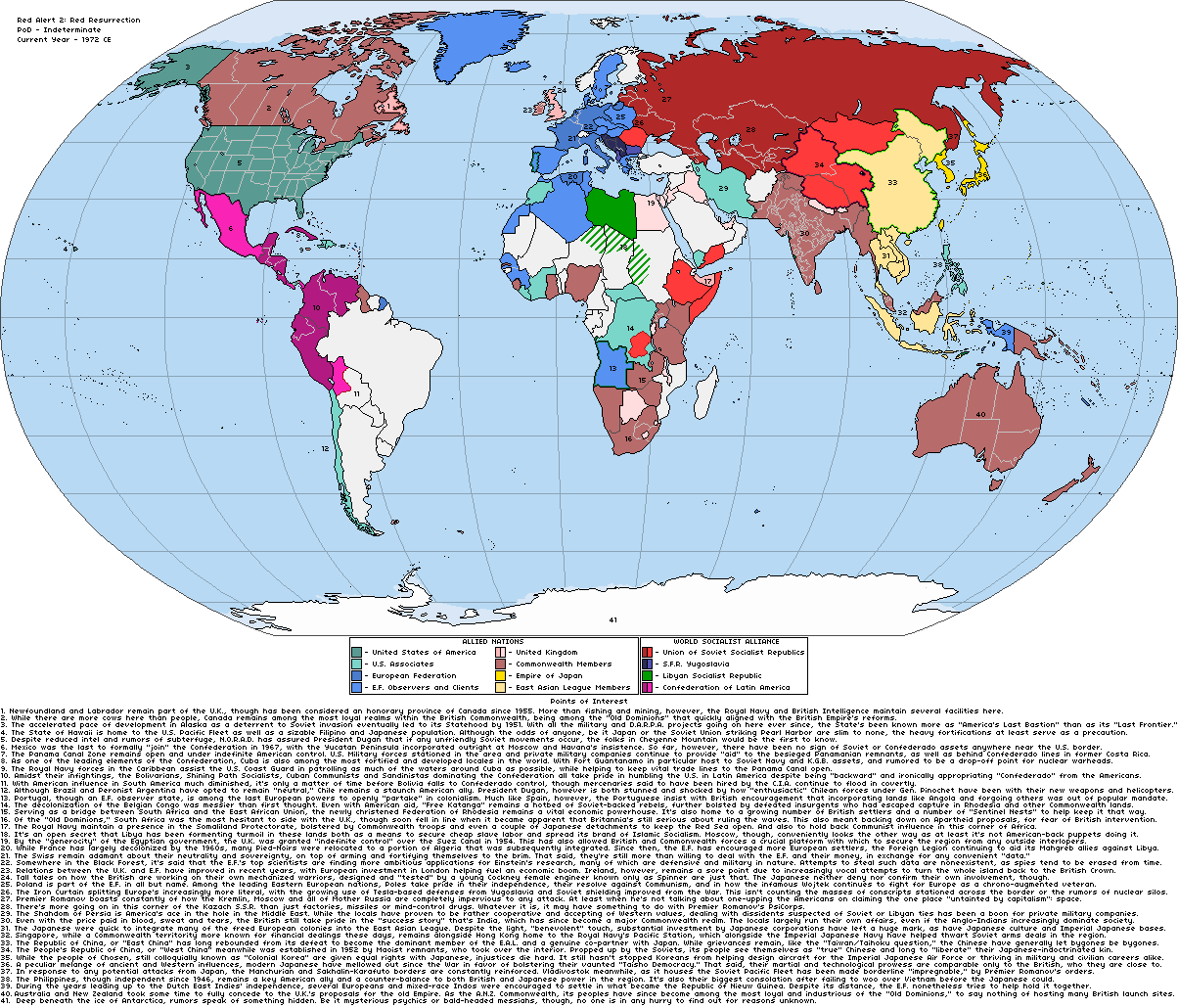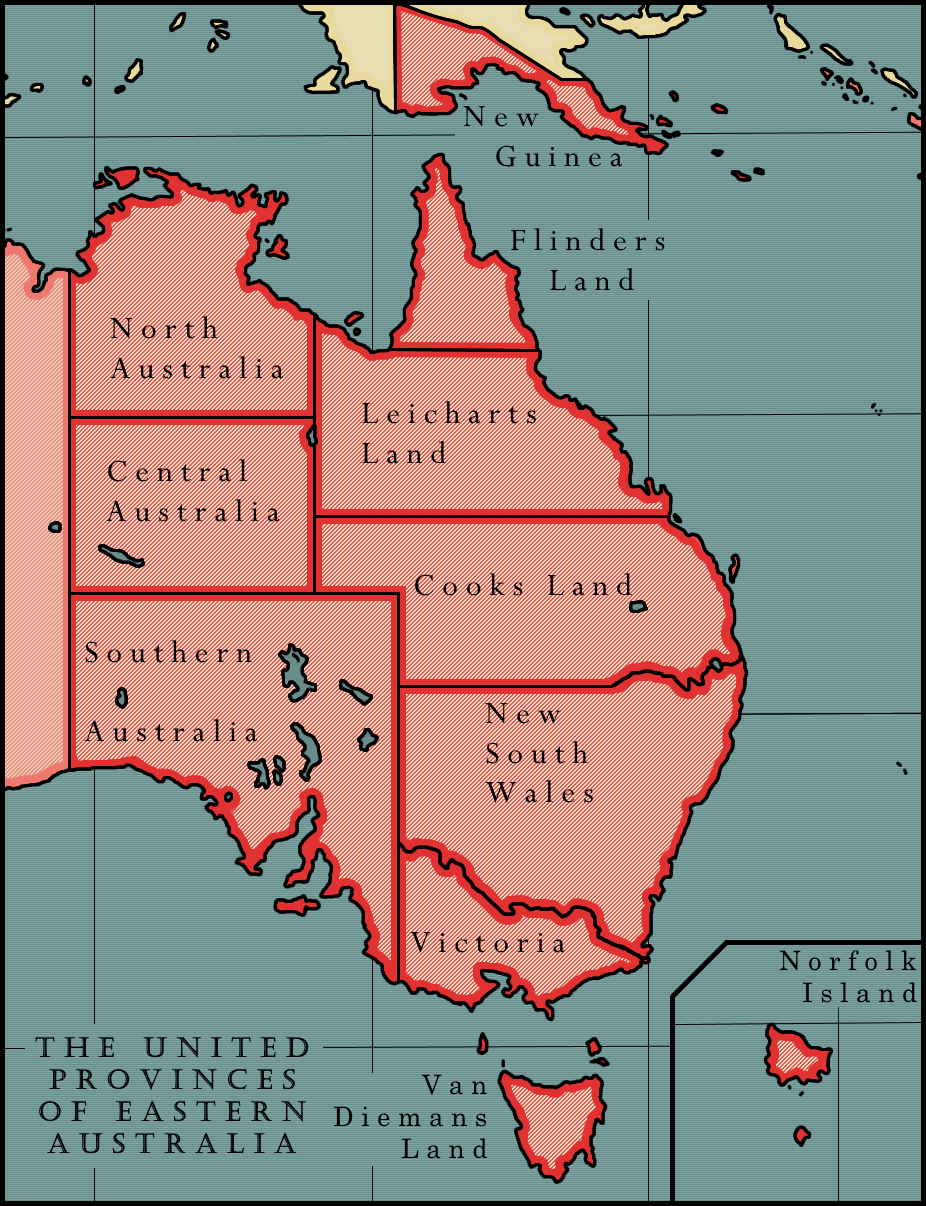Having
posted this earlier on DA, guess it won't hurt putting it here too. Keep in mind that this isn't a prequel to the Mental Omega map, but rather a more direct adaptation of the
Command and Conquer: Red Alert 2 Yuri's Revenge mod
Red Resurrection. Compared to MO, though, the mod is something of an "enhanced edition" of the main game if anything else.
----
Red Alert 2: Red Resurrection
In 1946, Albert Einstein traveled back in time to erase Adolf Hitler from history, with far-reaching consequences which only really come into play after his death.
In 1953, an alternate World War 2 drew to a close, resulting in the defeat of the Soviet Union and Stalin's death. The victorious Allied Nations, through the United States, picked Alexander Romanov, a distant relative of the late Tsar Nicholas II to be a puppet leader in the hopes of winning over and subduing the defeated USSR. This proved to be a grave mistake, as behind Romanov's charisma was a committed Communist and a seething anger at the Allies' hubris. In the years that followed, he appointed a mysterious man known as Yuri, a psychic who had been Stalin's most astute prodige, to be his chief advisor, though even in the figure's sudden disappearance the Premier proved to be more than competent. As relations with the Free World deteriorated, the Soviets rearmed themselves right under Allied noses, experimented on new technologies and once more spread the Socialist message to lands as far afield as China and South America.
It's the year 1972. Nearly 20 years on from the War, much has happened that would both shock and astound. Just in time for the long-standing "Cold War" to be on the brink of going hot.
The reconstituted Union of Soviet Socialist Republics (more often known as either the Soviet Union or just Soviet Russia) once more stands mighty as a global superpower. As head of the World Socialist Alliance, the Soviets remain staunchly committed to Communist ideals, albeit one that's in time become more of a melange of Marxist-Leninist, Russian nationalist and Pan-Slavic ideas. As a consequence of Premier Romanov's rearmament plans (at first conducted in hidden facilities deep in Siberia and the Urals, away from prying Allied eyes), the Soviet Armed Forces wield considerable influence; this in turn has allowed Russian generals leverage to revamp their military doctrine, resulting in a peculiar focus on mass-produced yet durable conventional forces, thermobaric and seismic weapons and even enhanced cybernetics (such as the "upgraded" veteran Volkov). In addition to these and a rebuilt nuclear arsenal, however, there's the PsiCorps. Even without the guidance of its progenitor, Yuri, this "science cult" of psychics has proven to be loyal to the Soviet cause and in conjunction with the feared KGB have been responsible for crippling many Allied efforts to infiltrate the USSR since the '60s. Meaning that outside official propaganda and the Premier's often flamboyant speeches, few really know what's going on within their borders, while their efforts to spread and support Communism abroad have become too flagrant to ignore.
Meanwhile, the Socialist Federal Republic of Yugoslavia reigns supreme in the Balkans as a major power in its own right. The result of a Serbian Communist coup led by Josip Broz Tito (a revolutionary from the War) in 1955 against the inept democractic government, it has since tried hard to overcome its troubled past, which for the most part has been a resounding "success." But even with Soviet cooperation, the South Slavic peoples comprising the SFR realized that their antiquated arsenal would make them easy prey to their European neighbors, prompting them to invest heavily on military R&D and more specifically the "unfulfilled potential" of Serbia's favorite son: Nikola Tesla. Their seeming flights of fancy, however, bore fruit, which they've been more than happy to share with the USSR. Indeed, on top of special Yugoslav divisions fielding advanced Tesla-based and experimental energy weapons, it's not without reason that the Soviets have made even more strides in technological development rivaling the Allies. Or that if propaganda footage of Yugoslav cosmonauts are accurate, their claims of being able to blast people from space are not entirely hollow.
Across the Atlantic lies the deceptively ramshackle Confederation of the Americas, which traces its origins to a pact by several Latin American Communist groups (which has since included Cuban Communists, Shining Path Socialists, Bolivarians and Sandinistas) to oppose Western and more specifially, US imperialism. Since 1957, the Confederation had brought several countries in South and Central America under its banner; toppling the "banana republics" and various corporate proxies, they've upended the balance of power virtually overnight to the point of being close to America's doorstep. Compared to other prominent members of the World Socialist Alliance, it remains the least developed and seemingly the most unstable. Yet despite constant infighting among the ruling cliques, there's a reason why the USSR considers these "Confederados" such vital allies. Through skilled guerilla tactics, ingenuity (especially in their helicopters and repurposed surplus planes), arms deals and sheer grit, they've been to hold back the American juggernaut and whatever mercenaries the CIA has thrown their way.
Then there's the Libyan Socialist Republic, arguably the most troublesome member of the Communist bloc. Having gained independence after the War (due to a bankrupt Italy being forced to abandon its colonies), Libya had originally been under the grip of American companies interested in its oil fields before a 1963 revolution secretly supported by Premier Romanov brought down the puppet monarchy in favor of Islamic Socialism. It quickly became apparent, though, that the ruling "Jamahiriya" regime cared little for the absurd costs paid for dragging the country into the future, going so far as to sow anarchic discord in neighboring lands and even promote slave labor (while "freeing" those willing to die for the cause) he while loyalists reaped the rewards. But as much as the Soviets would rather look the other way, Libyans' obsession with nuclear technology and radioactive waste combined with a shared disdain for the Allies proved to be far more alluring. Thus in spite of a sordid reputation, few would question the utter zeal of its people as personified by Labia, "Heroine of the Revolution."
As potent as the Soviets and their fellow Communists are, however, the Allied Nations are by no means left behind. Though seemingly more fratitious than when the War ended, the Allies remain committed to holding the Reds in check.
Among the nations of the Free World, the United States of America is one of the most powerful, and is so on purpose. As though to make up for their late entry into the War and seemingly minimal involvement in it, the Americans enacted a series of special loans and projects (often called "Ike Plans") that, while intended to help Allied countries also opened new opportunities to enrich themselves. Their meteoric rise and the fact they "won" the War unscathed has garnered envy and spite from more than a few across the world, the tendency of propping up puppets friendly to their interests most infamously backfiring in the form of the Confederation. Nonetheless, Americans at large, especially under President Dugan's administration, are as genuine with their commitment to democracy as they are to the free market. It's also not without reason that the men and women of the US Military are among the most well-funded and formidable soldiers on Earth, despite their seeming lack of experience; much like American capitalism, they maintain a presence across the world through various bases. And when lasers, Abrams tanks and good old firepower don't do the trick, there are mercenaries and private military companies willing to get the job done for the highest bidder, which so happens to be Uncle Sam.
Many of the "original" Allies on the Continent, however, were in spite of victory, left bankrupt and forced to retreat from the world. Yet from the ashes, a new resolve arose to never again face such indignity. The result is the European Federation, originally established by France, Germany and Italy in 1956 to counter both Communism and their erstwhile American peers. Unifying the most developed of Europe's nations (on top of a network of "observer" states and associates), the EF remains committed to its participatory democracy and enlightened values as a power in its own right. In practice, though, the European system owes as much to Mussolini as to Kalergi, if elitist posturing on European culture, extreme vetting on who to welcome into the union and a militant obsession with "civilized" supremacy at all costs suggest anything. Never mind how their "dedication to the exploration of science" also involves mostly covert experiments derived from Einstein's research (from Prism tanks to vortex weapons), which their largely Franco-German military has been more than happy to take part in.
Across the Channel though, the United Kingdom chose to make its finest hour everlasting. The War nearly brought the Isles to the brink, but unlike the Continent came out more intact and in a stronger position to maintain the British Empire. The UK was also among those who stood against the sudden wave of decolonization following the European retreat, seeing the demands for independence it inspired in the colonies as a threat. Thus, an audacious plan was enacted throughout the 1950s to preserve imperial glory, even if it meant going so far as to shoot protestors and crush any opposition. For the price paid in blood, the British earned nothing but scorn and condemnation especially from the European Federation. Yet years on, few would doubt how prosperous the reformed Commonwealth realms have become or how efforts to reconcile with the old colonies have borne tremendous fruit. Let alone the might of their highly experienced and versatile regiments (including the feared SAS), or the increasingly advanced technology employed in defense of Her Majesty's vast dominions. The latter having much to do with a reinvigorated bond with Japan.
Indeed, the Empire of Japan could be said to be a peculiarity as the "newest" member of the Allies. The success of "Taisho Democracy" over a militarist takeover in the 1930s did little to stop the island nation's designs for the Republic of China, which led to a "Pacific conflict" with the US (more of a series of stalemates and proxy battles) that ended as both found a common threat in Communism; indeed they were able to finish their Chinese campaign by 1950, in time to stop an attempted Soviet invasion amidst the War. Since then, the Japanese have grown more benevolent and expanded their East Asian League to encompass many former European colonies, all while benefiting from the immense wealth and resources at their disposal. The years of peace have also seen them not only rekindle old Anglo-Japanese ties. But also, in spite of their paradoxical traditionalism and devotion to their Emperor, make tremendous leaps in technology rivaling the EF (from modernized shinobi to mechanized power suits and weather manipulation) that have allowed Japan to hold back the Red tide as a proper great power.
As stable, if tenuous as the current state of the world may be, though, there are signs that everything may soon unravel. European researchers are rumored to have presented some curious finding to their superiors on how Einstein's first Chronosphere "test" might not be the only case of tampering with time. While evidence is still being gathered, some theorize that it may explain why the mysterious Yuri disappeared or even why the Japanese and British have been able to successfully hold their own far more than what seemed possible. Much of the attention among the Allied Nations' leaders, however has been on the unusual activity coming from the Communist bloc. While intel remains limited, reports have come in of increased buildup along the Iron Curtain and across the fringes of the Free World. There have also been more unconfirmed sightings of suspected KGB and PsiCorps operatives, with fears that the Allies' nuclear deterrent may be at risk of being compromised.
For President Dugan in particular, more worrisome are the Soviet troop movements, too big to be military exercises and seemingly aimed straight for the US. He's expected shortly to make a direct call to Premier Romanov, who not too long ago had made much publicized statements about peace and keeping the world in order. While some still think that it's some elaborate propaganda move, American and Allied commanders are expecting the worst. Already, several projects are being hastened to completion and for immediate deployment, which may hold back this potential Red Resurrection and perhaps secure a victory in any World War 3 scenario.
Hopefully it never comes to that.



